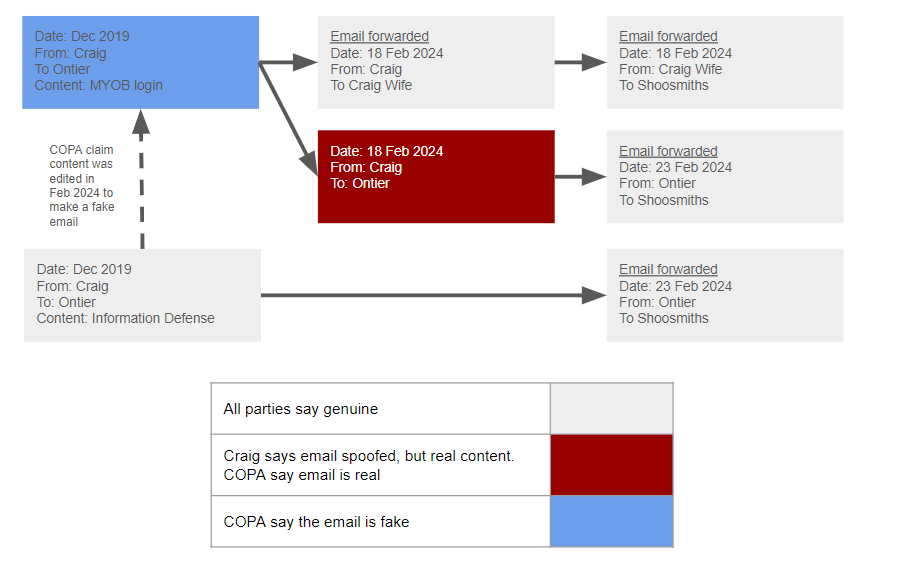ARTICLE AD BOX
The highly contentious COPA vs. Wright trial took a dramatic turn today as Craig Wright faced accusations of manipulating key evidence to support his claim of being Bitcoin’s pseudonymous creator, Satoshi Nakamoto. Reporting via the court live stream, CryptoSlate tuned in to hear Wright’s testimony in what is likely to be his final appearance.
The day’s proceedings focused on emails allegedly sent between Wright and his former legal firm, Ontier LLP. These emails are pivotal in proving or debunking Wright’s longstanding assertion of Satoshi Nakamoto’s identity.
COPA, represented by Mr. Hough, argued that changes to SPF (Sender Policy Framework) records for several domains controlled by Wright suspiciously occurred on Feb. 29, 2024, the same day Wright submitted new evidence. This timing casts doubt on the legitimacy of the submitted materials.
COPA focused its attack on a December 2019 email chain between Wright and Ontier about MYOB accounting software. While acknowledging the conversation as genuine, Wright claimed missing parts of the email existed.
Crucially, Wright’s wife sent a version of this same email chain to his current lawyers in February 2024. COPA highlighted that this email contained a nChain logo with a Feb. 18, 2024 timestamp – making it chronologically impossible as the email originated in 2019. Wright disputed this, bizarrely suggesting Google manipulates email timestamps.
After initial denial, Wright was forced to concede under cross-examination that the “Ramona email” his wife sent was not genuine. This admission came only after Ontier LLP confirmed the doctored email following their investigation.
Amid wandering testimony, Bitmex Research reporters captured the following statement from Wright,
“Hough: Is it your position that the spoofer, happened to do it on the same morning that your wife sent the real version, by coincidence?
CSW: Unfortuntely, yes.”
Bitmex Research compiled a graphic in an attempt to highlight Wright’s account of the evidence. Wright proclaims that on Feb. 18, 2024, Ontier received a fake email, which he contends contained legitimate information regarding his MYOB login details. Concurrently, he also emailed his wife with identical information, which he maintains was a legitimate communication.
 Craig Wright Ontier emails (Source: Bitmex Research)
Craig Wright Ontier emails (Source: Bitmex Research)Wright’s Defense: Spoofing Claims and Shifting Blame
In a counter-argument, Wright claimed an almost identical but spoofed email was sent to Ontier on Feb. 24, 2024. He made vague technical arguments about email headers and malleable timestamps, insisting dates cannot be trusted.
When pressed by the judge for specifics on the spoofing allegation – asking who was responsible and their motive – Wright claimed it was a simple act. He further suggested many people could be suspects, as many had copies of his emails. The judge intervened with pointed questions seeking clarity on Wright’s accusations.
Wright spent considerable time in his witness statement discussing an email he later declared fake. This contradiction, coupled with inconsistencies regarding the nChain logo and the coincidental timing of his SPF record changes, severely undermines Wright’s credibility.
Ultimately, Wright claims that a spoofed email was sent, making it look like he had forged it to discredit his claim. Essentially, he is not denying the forged data, but rather than admitting responsibility, he alleges someone is attempting to sabotage his defense.
After lunch, the expert witness, Mr. Madden, retook the stand. He stated,
“There are no such indicators of a spoof. The layout of this header is typical to standard infrastructure.”
A core part of Wright’s defense is that he, the alleged genius creator of Bitcoin, the most secure decentralized network on earth, has been hacked numerous times by multiple parties. Due to those hacks, he has been discredited.
The post Craig Wright confronted in court with alleged forged email identified by own lawyers appeared first on CryptoSlate.
.png)
 10 months ago
5
10 months ago
5








 English (US)
English (US)